Middle East Political Economy Summer Institute Network
SUMMER INSTITUTE PARTICIPANTS
2023 Workshop: Students
Mekeram Eljamal
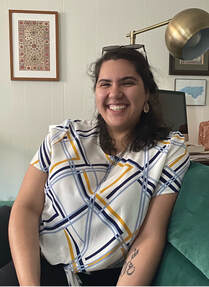
Mekarem Eljamal is a doctoral student in urban planning at Columbia University’s Graduate
School of Architecture, Planning, and Preservation. Her current research looks into the political
economy of Israeli “mixed cities,” with particular attention to Lydd. In excavating the “mixed
city” classification beyond merely an inaccurate description of lived realities, Eljamal looks at
how the conceptualization, definition, and deployment of “mix” in these cities shapes urban
development processes. Her research brings together discussions around the negotiation of
citizenship, maintenance of settler colonialism, and cloaking capacity of neoliberalism. Eljamal
is currently the managing editor for the Middle East Studies Pedagogy Initiative of the Arab
Studies Institute and an affiliate editor for History@Work, the blog for the National Council on
Public History. Eljamal holds a BA from the University of Michigan in International and Middle
Eastern and North African Studies, as well as an MA in Middle Eastern and North African
Studies and a Master of Urban and Regional Planning, both from the University of Michigan.
School of Architecture, Planning, and Preservation. Her current research looks into the political
economy of Israeli “mixed cities,” with particular attention to Lydd. In excavating the “mixed
city” classification beyond merely an inaccurate description of lived realities, Eljamal looks at
how the conceptualization, definition, and deployment of “mix” in these cities shapes urban
development processes. Her research brings together discussions around the negotiation of
citizenship, maintenance of settler colonialism, and cloaking capacity of neoliberalism. Eljamal
is currently the managing editor for the Middle East Studies Pedagogy Initiative of the Arab
Studies Institute and an affiliate editor for History@Work, the blog for the National Council on
Public History. Eljamal holds a BA from the University of Michigan in International and Middle
Eastern and North African Studies, as well as an MA in Middle Eastern and North African
Studies and a Master of Urban and Regional Planning, both from the University of Michigan.
Laila Mourad
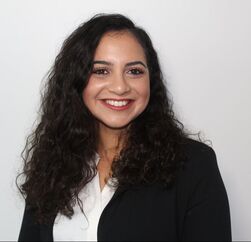
Laila Mourad is a PhD candidate at York University who adopts an interdisciplinary approach to the international development, political economy, and gender studies fields. Her research interests include alternative economies, social reproduction, as well as the localization of development. Recently, Laila is exploring how home-based labor in the ‘gig’ economy can inform and shape our understanding of the evolving notion of ‘work’. She examines how existing and emerging technologies transform the ways we envision household economies, societal relationalities and their role in development. She is the co-founder of the SWANA Collective, a collaborative student body that works towards cultivating alternative decolonial spaces that transcend academia. In her personal life she coaches, trains and competes in kickboxing, to cultivate resilience and wellness.
Mariam Taher
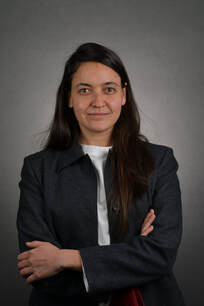
Mariam Taher is a doctoral candidate in the Department of Anthropology at Northwestern University. She holds two masters degrees in Middle Eastern Studies and international relations from Leiden University (NL) and the University of St Andrews (UK), respectively. Her research traces the cultural and linguistic expressions of safety and security among minoritized border communities in the MENA region, deploying mobility as an analytical lens to follow the entangled layers of individual and community experiences of surveillance and protection. Specifically, she examines states’ interconnected goals of economic profiteering, regulating gender, and securing territory as they play out among ethnic minority populations. Moving beyond the flattening frame of the security state, her research considers the situated experiences of in/security at a time when the intimate effects of securitization are increasingly yet unevenly felt throughout the world. Her work is featured in journals such as Ethnography and Cultural Anthropology.
Deena Saleh
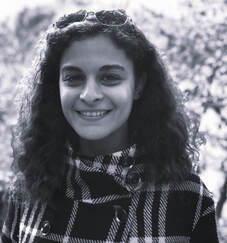
Deena Saleh holds a PhD in Economics from Istanbul University, Turkey, MSc in Economics from Hacettepe University, Turkey, and BSc in General Management Technology from the German University in Cairo (GUC). Her PhD dissertation examines long-term sources of social capital in MENA region from a sociocultural context. Saleh is currently a lecturer of economics, and has worked for a number of research centers in Turkey, with a focus on Middle East and North Africa. Her research interests include social capital, political economy, culture, and Middle Eastern studies.
Daryn Howland
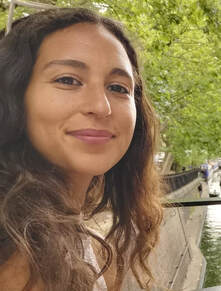
Daryn Howland is a PhD Candidate in Development Studies at SOAS, University of London. Her research focuses on the political economy of labour migration and its role in shaping contemporary capitalist development in the GCC, with a particular focus on the dynamics of race, gender, citizenship and class formation. She holds a BA in Political Science and Public Policy Studies from Duke University and a MA in Middle Eastern Studies from the American University of Beirut.
Chris Harding
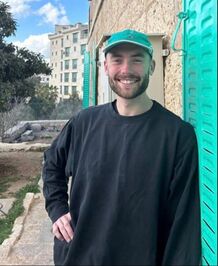
I am currently based in Palestine, working at the art and research centre Dar Jacir, in Bethlehem. Recently, I curated and chaired the Dar Jacir, Researching Palestine Seminar Series, which brought together eight early career researchers who presented talks on their respective projects, spanning diverse fields with, for example, talks focussed on Western Plant Blindness, the Bethlehem Psychiatric Hospital, Karimeh Abbud (Palestine's "first" female photographer) and the political economy of Palestinian embroidery. Whilst in Palestine I have spent time researching for my PhD in history which I will begin in Fall 2023, working mainly in archives--the Central Zionist Archives, Nablus Municipality Archive, the National Library of Israel, and other local collections. In my PhD project I plan to further my previous research (BA and MPhil) on the citrus trade during the British Mandate of Palestine, examining political and social thought relating to agricultural production and elites' ideas of capitalism and its uses in the latter years of the Mandate.
Samia Saliba
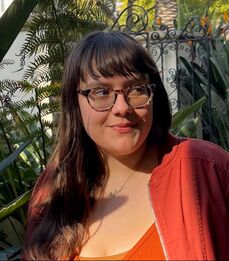
Samia Saliba (she/her/hers) is a first year Ph.D. student and Wallis Annenberg Fellow in American Studies & Ethnicity at the University of Southern California. She received her B.A. in History in 2020 from Western Washington University. Her work focuses on the intersection of gender and economic violence as seen through sanctions policies in Southwest Asia and Latin America. She is a member of the Radius of Arab American Writers and her poetry has been published in Mizna, Sycamore Review, Vagabond City Lit, and elsewhere.
Jad Baghdadi
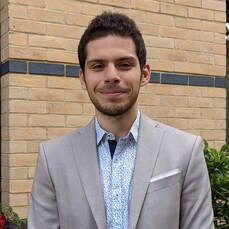
Jad is a Rhodes Scholar (Syria) and Doctoral student in political economy at the University of Oxford. His primary interest is in crony capitalism and business-state relationships in the Middle East. His PhD focuses on business-state relationships in Lebanon, with the aim of identifying politically connected business cronies and explaining their durability in the face of the current Lebanese financial crisis.
Jad has previously worked as a researcher for The Economist Group, the LSE Middle East Centre, the UN Human Rights Office, and other organisations. He holds a bachelor's degree in International Relations from LSE and a master's in Modern Middle Eastern Studies from the University of Oxford.
Jad has previously worked as a researcher for The Economist Group, the LSE Middle East Centre, the UN Human Rights Office, and other organisations. He holds a bachelor's degree in International Relations from LSE and a master's in Modern Middle Eastern Studies from the University of Oxford.
Engy Said
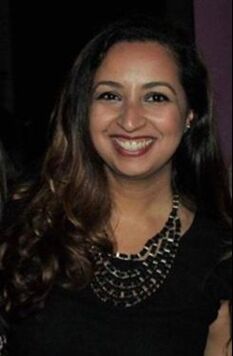
Engy is currently a Ph.D. Candidate in Peace and Conflict Resolution at Jimmy and Rosalynn Carter School, George Mason University. Her research interests focus on conflict resolution and transformation, economies of war and peacebuilding, post-conflict reconstruction, the role of the private sector, inequality, corruption, and governance, with a particular focus on the Middle East, Africa, and the Mediterranean. Engy has a keen interest in exploring how to leverage economics as a tool to reconcile divided societies. Her past research projects have focused on the role of identity in conflict and peacebuilding in Syria, Lebanon, and Iraq, the intersectionality between corruption and conflict, and how the COVID-19 pandemic is impacting fragile countries and countries in conflict, particularly multiethnic and multireligious societies. Engy's current research focuses on the relationship between structural violence and violent conflicts from a political economy perspective. Her current research looks at the intersectionality between economic and political power, institutional structures, and violent conflicts. She delivered multiple presentations at academic conferences on conflict resolution, conflict transformation, and peacebuilding in the Middle East.
Akram Salhab

Akram Salhab is a PhD student at Queen Mary, University of London. He holds a BA in politics from the University of Leeds (BA) and an MPhil in Politics from Balliol College, University of Oxford. His PhD research project looks at the Palestinian experience of establishing national institutions in the aftermath of the 1948 Nakba, and examines the organising practices and debates around sovereignty and self-determination that informed and accompanied these efforts.
Sascha Radl
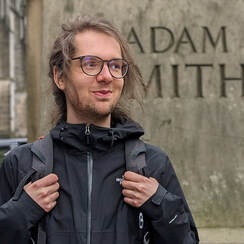
Sascha Radl studied Politics of the Middle East at the University of Marburg (Germany) and International Political Economy at King's College London (UK). He is currently doing his PhD at the University of Edinburgh (UK). His project is about the political economy of Tunisian state-society relations from a classical Marxist perspective. Key aspects include a theoretical critique of Weberianism, the effects of neoliberal capitalism, popular resistance, and the rise of Kais Saied. Alongside his dissertation, he is reading up on the climate crisis and is politically active in the UK as well as in Germany.
Jan Altaner
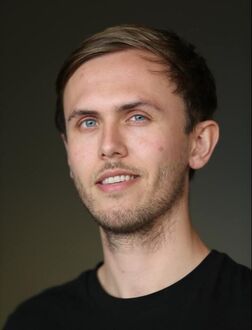
Jan Altaner is a PhD student in History at St John’s College, University of Cambridge. At the intersection of urban, social, and economic history, his dissertation explores the political economy of Lebanon’s urban space between 1943 and 1975, focusing on how urban space was increasingly transformed into a sphere for financial investments, and the implications this had for lower socio-economic strata. His broader interests include urban planning, heritage, global history, and social justice. Jan holds an MA in Middle Eastern Studies from the American University of Beirut, and a BA in History from the University of Freiburg.
Helin Kotan
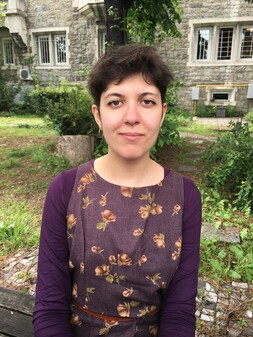
Helin is a MA student in the Department of Modern Turkish History at the University of Bogazici, Istanbul. Her current research focuses on the manifold engagements of the urban Kurdish proletariat with economy and politics in the realm of modern-day Istanbul. She earned her BA in Sociology at the Middle East Technical University, where she also did a minor in City and Regional Planning program.
Florence Wolstenholme
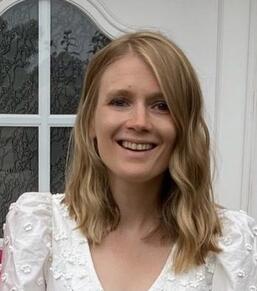
Florence Wolstenholme is a PhD candidate in the School of Politics and International Relations (SPIR) at Queen Mary University of London. Her doctoral thesis, entitled “Tracing the Development and Effect of Offshore Secrecy Jurisdictions in the UAE” will investigate how and why the UAE has developed as a globally significant offshore financial centre. Her research aims to analyse the categorical politics that underlie offshore finance in the Gulf, incorporating historical and theoretical analyses that address empire, decolonisation, racial capitalism, and the relationship between the state and capitalist classes, linking these wider trends back to the present-day activities that take place within the region’s free zones and offshore financial centres.
Florence has over a decade of experience as a corporate investigator, conducting beneficial ownership investigations and asset tracing projects. Her PhD project has been in large part inspired by the challenges of investigating who owns and controls assets incorporated in offshore financial centres.
She holds a BA in Arabic and Islamic Studies from the University of Oxford and a MA in Near and Middle Eastern Studies from SOAS.
Florence has over a decade of experience as a corporate investigator, conducting beneficial ownership investigations and asset tracing projects. Her PhD project has been in large part inspired by the challenges of investigating who owns and controls assets incorporated in offshore financial centres.
She holds a BA in Arabic and Islamic Studies from the University of Oxford and a MA in Near and Middle Eastern Studies from SOAS.
Zak Tobias
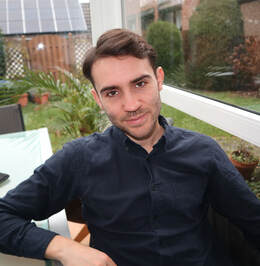
Zak Tobias is a PhD candidate based at the University of Queen Mary in London. His research interests are critical political economy, critical geography, Middle Eastern urban politics and science and technology studies (STS). These fields intersect in his current PhD project which seeks to interrogate digital transformation as a world-building endeavour through an ethnographic study of the Aqaba Special Economic Zone (ASEZ) in Jordan. The project aims to capture what is politically at stake within business-oriented practices which plan, advocate for and “perform” the extension of digital networks and the automation of a growing number of facets of daily working life. His previous research projects explored technological empowerment “markets” in Lebanon.
Fatin Jamalolail
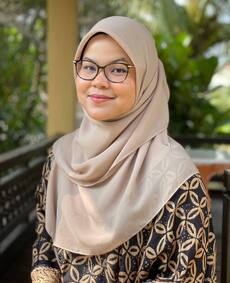
Fatin Nadhirah Jamalolail is currently working as a Senior Research Associate with the ASEAN Research Center, under the Asia School of Business in collaboration with MIT Sloan School Management. Her research interest revolves around social policy, labour welfare and political economy of development. At the moment, she is working on the role of functional Malay language among adult refugees and the political economy of labour welfare in the state of Kelantan. She graduated with an MA in International Political Economy and BSc in Economics, Politics and International Studies at the University of Warwick, UK. Before becoming a senior research associate, she previously worked as a policy analyst in a pension fund in Malaysia focusing on formulating policies related to social protection and wellbeing. Her recent research project include the study of hawker culture and collective action of hawkers in Malaysia.
Ranjani Srinivasan
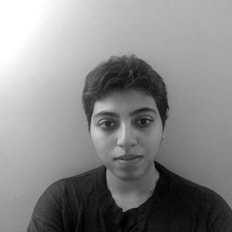
Ranjani Srinivasan (they/them) is a Doctoral candidate in Urban Planning at Columbia GSAPP. They hold a Bachelor’s in Design from CEPT University in Ahmedabad and was awarded the Fulbright Nehru and Inlaks Scholarships to pursue their master’s degree in Critical Conservation at the Graduate School of Design, Harvard University.
Prior to starting their PhD at Columbia, Ranjani worked as a project associate at an environmental conservation and planning advocacy nonprofit in Washington, D.C. where they campaigned for critical landscapes and frontier communities at-risk of climate change. They have also worked as an urban researcher for the West Philadelphia Landscape Project (WPLP) at the Department of Urban Studies and Planning, MIT, and as a field researcher for international development agencies in South Asia.
Ranjani is broadly interested in urbanization, the political economy of development, and historical geographies of capitalism and caste. Their dissertation will investigate how state-led land acquisition within public sector mining blocks and reserved constituencies affects Dalit political claims-making and land rights.
Prior to starting their PhD at Columbia, Ranjani worked as a project associate at an environmental conservation and planning advocacy nonprofit in Washington, D.C. where they campaigned for critical landscapes and frontier communities at-risk of climate change. They have also worked as an urban researcher for the West Philadelphia Landscape Project (WPLP) at the Department of Urban Studies and Planning, MIT, and as a field researcher for international development agencies in South Asia.
Ranjani is broadly interested in urbanization, the political economy of development, and historical geographies of capitalism and caste. Their dissertation will investigate how state-led land acquisition within public sector mining blocks and reserved constituencies affects Dalit political claims-making and land rights.
Ryia Al Sanah
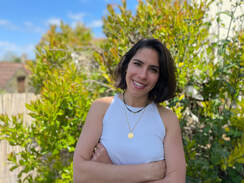
Riya Al’Sanah is a first year Phd candidate at the Institute of Arab and Islamic Studies, University of Exeter (UK). Her research focuses on the Israeli state’s ‘financial inclusion’ policies targeting ’48 Palestinians, situating these policies within the broader dynamics of the financialisation of Israeli housing markets. In particular, the project looks to delineate these policies’ historical development, the character of the mechanisms involved, to reveal their influence on shaping the social structure, living conditions, and future perspectives of ’48 Palestinians.
She has previously worked as the director of Who Profits research center and has authored a number of reports on the working conditions of Palestinian workers in the Israeli economy, including for the International Trade Union Confederation (ITUC). Riya’s broad research interests are financialization, political economy, housing and the labour movement in Palestine.
She has previously worked as the director of Who Profits research center and has authored a number of reports on the working conditions of Palestinian workers in the Israeli economy, including for the International Trade Union Confederation (ITUC). Riya’s broad research interests are financialization, political economy, housing and the labour movement in Palestine.


